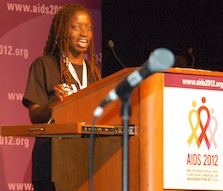Training HIV Care Providers
 Zupenda Davis, MPH, MCHES, a SPH doctoral candidate, did not know public health even existed as a career field when she was an undergraduate student. She soon became interested in public health because she saw how poverty and other social factors influenced disease and teen pregnancy.
Zupenda Davis, MPH, MCHES, a SPH doctoral candidate, did not know public health even existed as a career field when she was an undergraduate student. She soon became interested in public health because she saw how poverty and other social factors influenced disease and teen pregnancy.
“I was so intrigued to learn about the social and behavioral factors that are related to disease, morbidity and health disparities,” said Davis (far left in photo). “I wanted to be able to do something about it.”
Davis is a now a training specialist with the PA/MidAtlantic AIDS Education & Training Center for the Health Federation of Philadelphia. She spends her days coordinating trainings for area physicians and other care providers on the best practices of HIV care, guiding local HIV/AIDS organizations, writing grants, supervising interns and volunteers, and helping to get a citywide protocol for non-occupational Post Exposure Prophylaxis (nPEP) approved as a standard of care.
Davis is part of a team that typically coordinates more than 300 training sessions annually. The trainings can range in size from 25 to 400 clinicians and other service providers.
“By keeping their practices and knowledge updated it will maintain and help improve the care that they give, and thereby help increase the health status and lives of HIV-infected consumers,” said Davis.
“Public health can help provide people with the knowledge on how to stay healthy and prevent illness. This helps people to better manage their health care and to keep overall healthcare costs down because there are less hospitalizations,” said Davis.
“At the same time, public health helps those already exposed to HIV/AIDS get early screening, take precautions to stay healthy and not expose others if they test positive for the virus. Although HIV treatment is generally expensive it is far more cost effective than hospitalizations that occur due to late HIV diagnosis, or opportunistic infections because the positive person is not in care,” said Davis.
Davis also presents at events, including a session in connection with the International AIDS Conference this year in Washington, D.C., where she blogged about her experience and participated in events with Hillary Clinton, Valeria Jarret, a senior advisor to President Barack Obama, and singer Alicia Keys.
After all this during the day, she spends her nights completing her doctorate dissertation on African American heterosexual men ‘s intimate relationship experiences and HIV/AIDS. She enjoys the collaboration generated by her work and research.
“At the Health Federation of Philadelphia, I am able to work closely with the Philadelphia Department of Public Health and the SPH to ensure a multifaceted approach to save lives and money,” said Davis.
Editor's note 12/10/2013: Zupenda Davis is now an associate professor and director of the undergraduate public health program at LaSalle University.